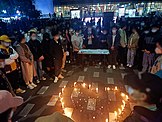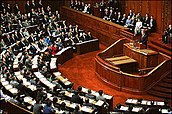From today's featured article

Shepseskaf was a pharaoh of ancient Egypt who reigned in the late 26th to the mid–25th century BC. He was the sixth and probably last ruler of the fourth dynasty during the Old Kingdom period. His name means "His soul is noble". Shepseskaf might have been the son or possibly the brother of his predecessor Menkaure. During his reign of four to seven years, Shepseskaf completed the mortuary complex of the Pyramid of Menkaure, the smallest of the three main pyramids of Giza, using mudbricks. For his own tomb he abandoned the Giza necropolis and built a mastaba, a flat-roofed rectangular structure now known as the Mastabat al-Fir'aun, at South Saqqara. These decisions may have reflected his short reign, a declining economy, or a power struggle between the King and the priesthood of Ra. Alternatively, Shepseskaf may have intended his tomb to be a pyramid, but after his death it was completed as a mastaba. (Full article...)
Did you know ...
- ... that a design competition was held in 2022 to find a replacement for the coat of arms of Curaçao (depicted)?
- ... that Carter Moore Braxton fought for the Confederacy throughout the American Civil War and, according to one report, had seven horses killed under him but avoided any wounds?
- ... that the Adoration of the Magi with Saint Helena was once the main altarpiece at Sant'Elena, a church dedicated to its namesake?
- ... that after the Supreme Court of Ohio imposed restrictions on bail procedures, the dissenting justices participated in a bus tour to campaign for a ballot measure that took away their power on that issue?
- ... that a peace monument was erected for Turkish journalist Abdi İpekçi in the place where he was shot and killed by an assassin 21 years earlier?
- ... that in 2016 an inflatable gorilla was erected on the top of the Sky Trek Tower for Six Flags Great America's Halloween event Fright Fest?
- ... that Ugandan military officer Bernard Rwehururu originally wanted to become a Catholic priest, but enlisted as a soldier to pay for his siblings' school fees?
- ... that Delsworth Buckingham was an Odd Fellow?
In the news

- A deadly fire in Ürümqi escalates ongoing protests across China (vigil pictured) in response to the government's zero-COVID policy.
- Anwar Ibrahim of the Pakatan Harapan coalition becomes Prime Minister of Malaysia after the general election produces the nation's first hung parliament.
- An earthquake centred near Cianjur in Indonesia's West Java kills at least 323 people and injures more than 7,000 others.
- In Canadian football, the Toronto Argonauts defeat the Winnipeg Blue Bombers in the Grey Cup.
On this day
November 29: Liberation Day in Albania (1944)
- 903 – The Abbasid Caliphate captured the Qarmatian leadership at the Battle of Hama in Syria, opening the way for the reconquest of Tulunid Egypt.
- 1776 – American Revolutionary War: British reinforcements brought an end to the Patriot attempt to capture Fort Cumberland in Nova Scotia.
- 1890 – The National Diet of Japan (pictured in session), a bicameral legislature modelled after both the German Reichstag and the British Westminster system, first met in Tokyo.
- 2007 – During their trial for the 2003 Oakwood mutiny, Philippine soldiers led by Senator Antonio Trillanes mutinied and seized a conference room in The Peninsula Manila in Makati.
- Claudio Monteverdi (d. 1643)
- Mary Somerville (d. 1872)
- Lalit Modi (b. 1963)
Today's featured picture

|
Louisa May Alcott (November 29, 1832 – March 6, 1888) was an American novelist, short story writer, and poet best known as the author of the novel Little Women (1868) and its sequels Little Men (1871) and Jo's Boys (1886). Raised in New England by her transcendentalist parents, Abigail May and Amos Bronson Alcott, she grew up among many well-known intellectuals of the day, such as Ralph Waldo Emerson, Nathaniel Hawthorne, Henry David Thoreau, and Henry Wadsworth Longfellow. Photograph credit: George Kendall Warren; restored by Adam Cuerden
Recently featured:
|
Other areas of Wikipedia
- Community portal – The central hub for editors, with resources, links, tasks, and announcements.
- Village pump – Forum for discussions about Wikipedia itself, including policies and technical issues.
- Site news – Sources of news about Wikipedia and the broader Wikimedia movement.
- Teahouse – Ask basic questions about using or editing Wikipedia.
- Help desk – Ask questions about using or editing Wikipedia.
- Reference desk – Ask research questions about encyclopedic topics.
- Content portals – A unique way to navigate the encyclopedia.
Wikipedia's sister projects
Wikipedia is written by volunteer editors and hosted by the Wikimedia Foundation, a non-profit organization that also hosts a range of other volunteer projects:
-
Commons
Free media repository -
MediaWiki
Wiki software development -
Meta-Wiki
Wikimedia project coordination -
Wikibooks
Free textbooks and manuals -
Wikidata
Free knowledge base -
Wikinews
Free-content news -
Wikiquote
Collection of quotations -
Wikisource
Free-content library -
Wikispecies
Directory of species -
Wikiversity
Free learning tools -
Wikivoyage
Free travel guide -
Wiktionary
Dictionary and thesaurus
Wikipedia languages
This Wikipedia is written in English. Many other Wikipedias are available; some of the largest are listed below.
-
1,000,000+ articles
-
250,000+ articles
-
50,000+ articles

